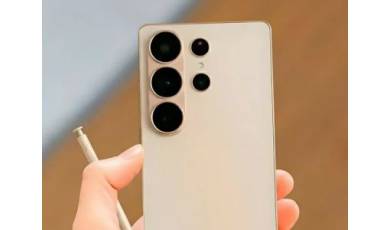Flash firmware on Digma Platine 1579M 4G
Mobiles >> Digma >> Digma Platine 1579M 4G| Specifications | Reviews | Secret codes |
| Unlock phone | Root phone |
| Backup | Flash Firmware | Screenshot |
How to flash Digma Platine 1579M 4G?
Why reinstall the firmware?
Errors start to appear in the operating system.
Some installed applications do not open.
Many programs from the Play Market do not work.
The phone restarts or shuts down randomly.
The phone began to work slowly.
The OS does not match the system requirements of the smartphone.
Where can I find the firmware?
On the official website of your phone manufacturer.
On sites where third-party developers post custom operating systems.
What should be done before installing the firmware?
Create a backup copy of user data, contacts and photos and transfer it to your computer.
Insert SD card. An SD card is needed to write firmware to it.
Find information about your smartphone model.
Fully charge your device. If the battery runs out during the firmware, the device will no longer turn on.
Download archive with Firmware. Place it on the SD card.
Installing TWRP Recovery
Download and install the Official TWRP App from the Play Market.
When you start the application for the first time, you must agree to install a new firmware and all the risks associated with this, as well as agree to grant the application Superuser rights and click the 'OK' button.
After moving to the next screen, you need to select the 'TWRP FLASH' item and give the application root rights.
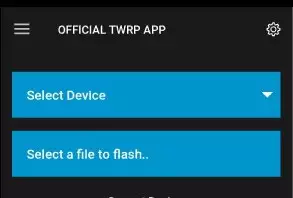
On the main screen of the application, select 'Select Device', and find your phone model.
After selecting a device, the application will direct the user to a web page to download the appropriate modified recovery environment image file. Download the suggested *.img file.
When the download is finished, you need to return to the main screen of the Official TWRP App and click on the 'Select a file to flash' button. Select the file downloaded in the previous step.
Press the 'FLASH TO RECOVERY' button and confirm your choice, press 'OK'.
When the message 'Flash Completed Succsessfuly!' appears on the screen. Click the 'OK' button. The TWRP installation procedure is now complete.
Transfer the necessary files to the SD memory card. Using a PC or laptop card reader, it will be much faster.
Insert a memory card into your phone.
To reboot into recovery, you need to use a special item in the Official TWRP App menu, accessible by pressing the button with three stripes in the upper left corner of the main screen of the application. We open the menu, select the 'Reboot' item, and then click on the 'REBOOT RECOVERY' button. The phone will reboot into the recovery environment automatically.
Firmware via TWRP
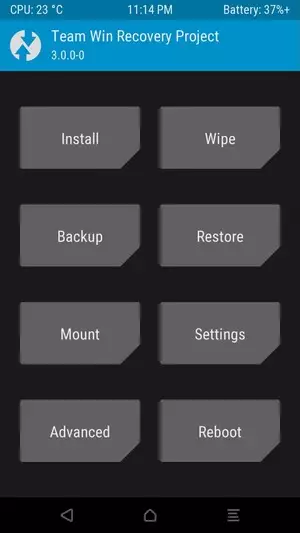
Before flashing, you need to delete all user data from the phone, this will avoid many problems. press 'WIPE' on the home screen.
Now you can start flashing. Click the 'Install' button.
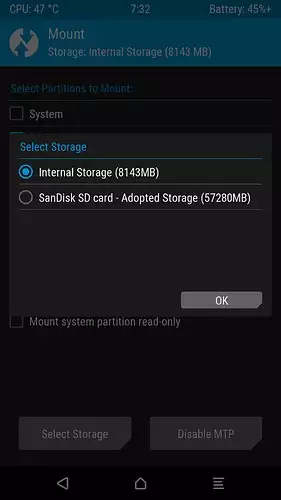
On the file selection screen, at the very top there is a 'Storage' button for selecting an SD card.
Select the storage to which the files were copied.
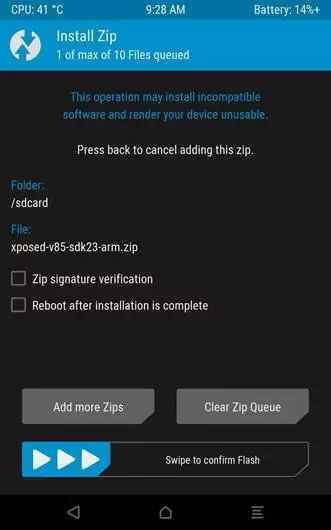
Find the file we need and click on it. A screen opens with a warning about possible negative consequences, you need to check the item 'Zip signature verification', which will avoid using corrupted files when writing to the phone's memory sections.
The procedure for flashing the phone will begin, accompanied by the appearance of inscriptions in the log field and the movement of the progress bar.
The completion of the firmware installation procedure is indicated by the inscription 'Successful'.
Summary: Colors: Black; Dimensions: 243 x 173 x 9 mm; Weight: 540 g, 1.19 lbs, 19.05 oz; Body materials: Plastic; Type: IPS; Display Colors: 24 bit, 16777216 colors; Size: 10.1 in, 256.54 mm, 25.65 cm; Screen-to-body ratio: 70.59%; Resolution: 1920 x 1200 pixels; Pixel Density: 224 ppi, 88 ppcm; Display features: Multi-touch, Capacitive; Primary: 2592 x 1944 pixels, 5.04 MP; Flash: LED; Video Recording: 1280 x 720 pixels, 0.92 MP at 30 fps; Secondary: 1600 x 1200 pixels, 1.92 MP; Camera Features: Continuous shooting, Geotagging, Digital zoom, HDR, Scene mode; Video Playback: 3GPP, AVI, MP4, Xvid; Audio Playback: AAC, AMR / AMR-NB / GSM-AMR, eAAC / aacPlus v2 / HE-AAC v2, FLAC, MIDI, ...
Comments, questions and answers on the flash firmware Digma Platine 1579M 4G
Ask a question about Digma Platine 1579M 4G

